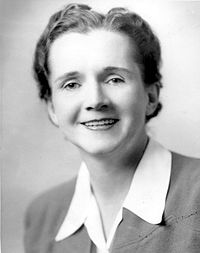I must admit that I somehow got through many years of my geographic education without actually reading Silent Spring, but when I started teaching environmental geography at the college level, I went back to this classic. The textbook I use for my introductory course mentions its 1962 publication as a turning point in U.S. environmental history, so I decided I should read it for myself. Carson's remarkably clear writing is actually pleasant to read, despite its grim subject matter. It is also important to read, for the insights it provides into the hubris of modernism.
The documentary Rachel Carson's Silent Spring (also see IMDB listing), produced at WGBH in Boston, tells Carson's story of pesticides and the meta-story of her dedication to telling that story. This is a book that the chemical industry of her day did not want Carson to publish, and any less determined author would have failed to see it to completion. I have seen the film no fewer than thirty times, so that when I read certain passages of the book itself, the voice in my head is that of Meryl Streep. Almost as strongly associated is the booming voice of publisher Paul Brooks, an ardent defender of Carson and her work. I learned only recently that he was an accomplished environmental writer in his own right, with a special collection in the library of the Walden Woods Project at the Thoreau Institute in Lincoln, Massachusetts.
 |
| FWS Employee Photo |
It is a sad irony that a woman who worked so hard to eliminate a cause of cancer in the world at large succumbed to cancer herself just two years after the book was published. Her legacy continues in the work of the Silent Spring Institute on Cape Cod. Unlike the vast majority of organizations devoted to cancer research, this institute pursues research on environmental causes, rather than genetics or treatment. All three are important, of course, but people seem to resist environmental explanations just as much today as they did in Carson's time. Because the Institute is committed to finding the causes of elevated cancer rates in certain places, a lot of its research involves geographers.
Rachel Carson continues to stir controversy, mainly among apologists for pesticides, who claim that her work is responsible for the persistence of malaria in the tropics.
No comments:
Post a Comment
Thanks for your comment and your interest in my blog. I will approve your comment as soon as possible. I had to activate comment moderation because of commercial spam; I welcome debate of any ideas I present, but this will not be a platform for dubious commercial messages.